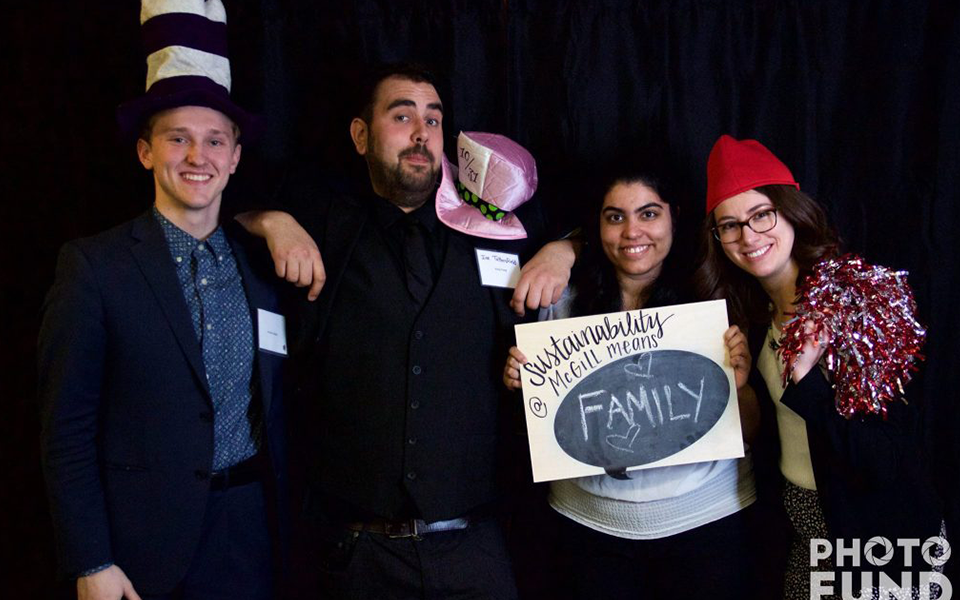I read somewhere that the things that change the course of your life don’t announce themselves – they whisper in your ear. It’s funny when you think about it.
It was a crisp day in October 2014 when I first walked into the McGill Office of Sustainability (MOOS) for an interview. I wasn’t expecting the job at all. I remember walking nervously into the room and talking continuously, for the next thirty minutes, about my ideas for an interactive launch of the Vision 2020 Sustainability Strategy. A week or so later, I was sitting in the office and planning the launch. It was an exciting and surreal time: the hard work of implementing the sustainability strategy had just begun, and I was in my second year of university. As a newcomer to the vibrant sustainability community at McGill, I had a million questions. What did the words ‘climate justice’ and ‘direct action’ mean? What student-staff-faculty relationships were key to building a more sustainable university? How did we compare with other universities in pursuit of sustainability? What was social sustainability, really?
As I began to learn about the diverse sustainability actions and initiatives on campus, my questions were slowly answered. Although student turnover at McGill dramatically changes the landscape of student life each year, environmental groups and social sustainability initiatives have inspired and mobilized students for a long time. In 2014, groups like the McGill Farmers Market and the Macdonald Student-Run Ecological Gardens occupied a distinct food sustainability niche, whereas projects like ECOLE and the McGill Spaces Project were reshaping the way students viewed urban and collective living. Slowly, conversations about mental health awareness and the resources available for victims of sexual assault were taking up more space in public forums; more than ever before, people discussed the importance of the Rez Project in sensitizing students. It was becoming clear that unless the social fabric of the university was strengthened by services and institutional support, the sustainability community would lack the momentum required to mobilize the community towards climate solutions. In terms of staff and faculty engagement, ground-breaking work was taking place in the operations and procurement side of McGill; staff members were testing out better ways to address food waste, carbon emissions, and rising energy consumption. There was a renewed interest in green chemistry and applied research, and faculty members were evaluating the planetary boundaries of ecological systems as global economies shifted towards ‘climate-smart’ practices. Soon, divestment became a prominent issue on campus, and dozens of students united to express their discontent with the state of socially responsible investment at McGill. It was in this dynamic and evolving melting pot of sustainability initiatives that I aimed to find my own place.
I had an exciting task at MOOS: I was responsible for disentangling the sustainability movement at McGill. I spent many hours writing stories, blog posts, emails and social media posts that invited students to get involved in events and actions surrounding sustainability at McGill. My favourite moments in the office were spent interviewing passionate SPF project leaders, discussing social media strategies at weekly check-ins, making jokes at semesterly MOOS potlucks, celebrating with the staff after the Catalyst Awards, and laughing with my colleagues as we proposed outlandish ideas like flash mobs or parades at communications huddles. In the three years that I’ve spent here, I have learned a great deal about SPF-funded projects that were gradually and quietly creating a culture of sustainability, including the LEED operations and management project, the family care coordinator project, student food collectives, and food/waste education programs. It was humbling and inspiring to have conversations with staff members and students who cared so deeply about the people and practices in this institution. Here were innovators, pioneers, and catalysts – people who were pushing the envelope and changing the game to build a better future for us all.
More than once, simple conversations at the MOOS changed my experience of McGill. One afternoon, as I walked into the office, I overheard a meeting between the student engagement facilitator, Lily Schwarzbaum, and a student named Alan Chen. They were talking about a small house on 3559 University Street that had recently become an SPF project. I asked them what time the group’s collective meeting was, and I ran through the rain to get there after work (the image to the left is one such meeting). The house was a meeting place for several sustainability-related groups on campus, and they told me that they envisioned a dynamic student community interested in applied student research, urban sustainable living, and alternative economics. I was hooked. Participating in collective meetings at ECOLE soon became one of the most important commitments of my university life. The following year, I became a live-in facilitator there, and it was one of the most rewarding and adventurous years of my life.
Today, I can honestly say that I owe all of my skills and a great deal of my personal growth to MOOS and the sustainability community at McGill. I learned how to facilitate a consensus-based decision-making process, lead anti-oppression workshops, coordinate and run huge events, explain the importance of social justice in relation to climate change, and participate in fruitful collaborative endeavours full of hope and positive energy. It was here that I began to work on projects with passionate activists and curious researchers. The people that I interacted with at MOOS made me ask new questions and look for new ideas – and I will always be grateful for the opportunities that I received here. It’s been a wild, unforgettable, and wonderful ride – and it all began when I walked nervously into the room and talked for thirty minutes straight.




